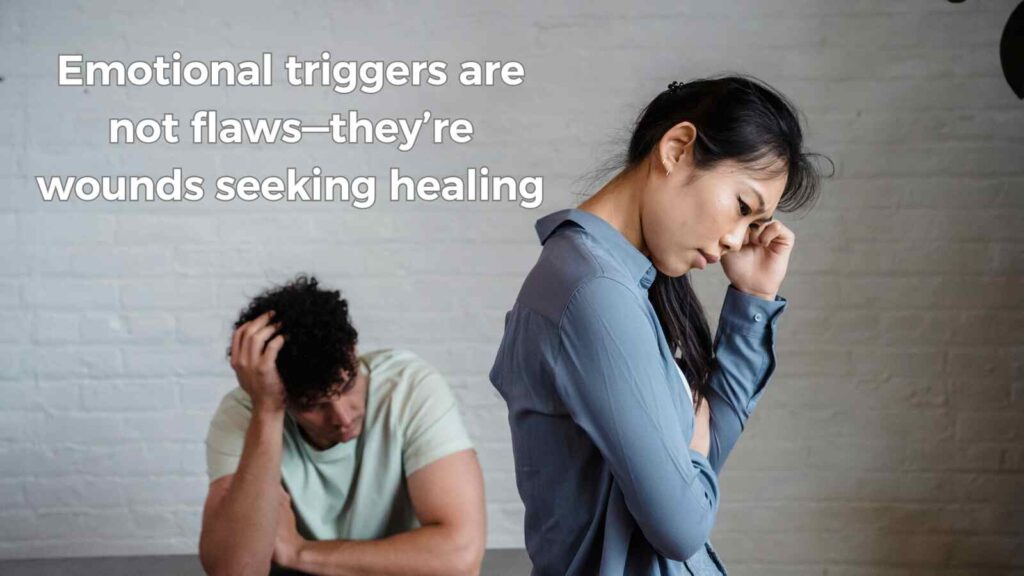Emotional triggers are automatic reactions to specific situations that connect to past experiences, thoughts, habits, or beliefs. When we react without analyzing a situation, we are often responding from a trigger point. These trigger points can develop from habitual behaviors, overwhelming experiences, or beliefs formed through circumstances.
Triggers are not intentional but are behavioral patterns stored in the subconscious mind. Over time, repeated reactions make these patterns automatic, causing us to react without a second thought. Triggers often include emotions like anger, victim mentality, worry, nervousness, crying, passive aggression, blaming, criticizing, or judging.
A few months ago, I met my cousin, who was married but looked unhappy and unsatisfied. When I asked her about it, she hesitated at first but eventually opened up. She shared how she and her husband always fought whenever she brought up her in-laws’ behavior toward her. He would get angry, accuse her of trying to defame his parents, or avoid the conversation entirely.
She was overwhelmed and didn’t realize that her husband’s emotional connection to his parents was the root of the issue. He saw his parents as figures of love and respect and couldn’t accept hearing anything negative about them. His reactions were automatic, stemming from his deep attachment and past conditioning.
I consoled my cousin and advised her to stop criticizing his parents altogether. Instead, I encouraged her to focus on building a stronger emotional connection with her husband. I explained that fighting or trying to convince him would only make him more defensive.
Over time, as she stopped bringing up the topic, her husband began observing the situation himself. Eventually, he realized that her concerns were valid. He acknowledged his mistakes and started balancing his relationship with his wife and parents without judgment.
Emotional triggers require realization and time to heal. Without awareness, we remain stuck in reactive patterns. But with patience, understanding, and self-awareness, it’s possible to heal these triggers and create healthier, more balanced relationships.
Types of Emotional Triggers and Their Impact on Relationships
Relationships are such a beautiful part of life—they’re about two people coming together to share their world. But when two individuals have grown up in completely different circumstances, they bring along different emotional triggers shaped by their past, habits, and beliefs.
Often, we don’t even know these triggers exist until we’re deep into the relationship. Over time, they can cause fights, sadness, or misunderstandings. Sometimes, these issues grow so big that they lead to separation.
The problem is, we’re often so caught up in proving we’re “right” that we don’t stop to see things from the other person’s perspective. But understanding and healing these triggers can make all the difference.
Let’s talk about some of the most common emotional triggers and how they affect relationships.
1. Criticism or Judgment
Nobody likes being judged—it’s as simple as that. Comments like “Why are you like this?” or “Why can’t you be more organized?” may seem small, but they add up over time.
At first, your partner might ignore it, but eventually, these words start to hurt. They react, arguments happen, and it all spirals from there.
What to do instead:
If something bothers you, try to bring it up gently. For example, say, “I think it’d be nice if we both worked on keeping things tidy,” instead of “Why are you always so messy?” The goal isn’t to change them but to have a conversation that builds understanding.
2. Fear of Abandonment
Let’s say your partner is super attractive and gets a lot of attention—it’s flattering at first, but it can also bring up insecurities. You might start worrying, “What if they leave me for someone else?” These fears, if left unchecked, can lead to self-sabotaging behaviors.
How to deal with it:
Be honest with your partner about how you feel. Share your insecurities calmly. A loving partner will listen and reassure you. This kind of openness can strengthen your bond and ease those fears over time.
3. Feeling Unappreciated
This one’s super common. Imagine putting so much effort into making a special meal for your partner, only for them to eat it while scrolling on their phone. It hurts, doesn’t it?
How to approach it:
Before jumping to conclusions, check in with them. Maybe they had a rough day and weren’t thinking clearly. Try saying something like, “Hey, I made this with a lot of love today, and it would mean a lot if you noticed.” That gentle reminder can go a long way in making them more mindful next time.
4. Past Trauma or Betrayal
We all carry baggage from our past. Maybe your partner grew up in a toxic environment or faced betrayal before. These experiences can create trust issues or unhealthy patterns in your relationship.
What you can do:
Be patient. Instead of judging their actions, try to understand where they’re coming from. Help them see what a healthy relationship looks like. With time and consistent love, they might start healing those old wounds.
Final Thoughts
Emotional triggers can feel overwhelming, but they don’t have to ruin your relationship. By being kind, patient, and open to communication, you can turn these challenges into opportunities to grow closer together.

